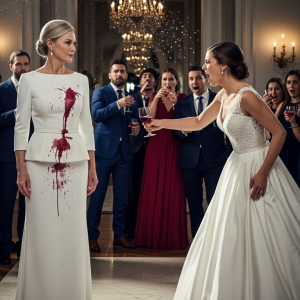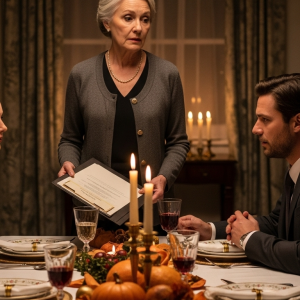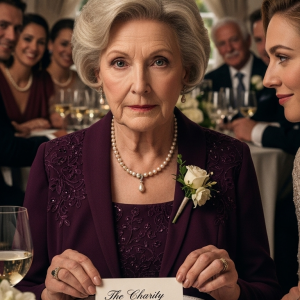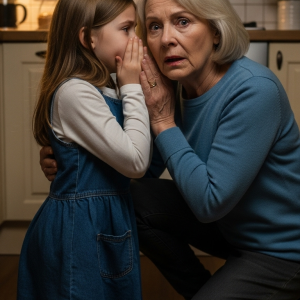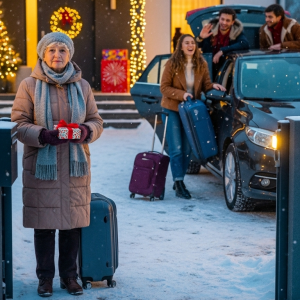I never expected to be the villain in my own family’s story. It crept up on me, I suppose. One quiet dismissal at a time, one thankless gesture, one phone call that never came. And yet, when Madison, my first granddaughter, looked me dead in the eye and called me “too basic” for her bridal shower, something inside me shattered so cleanly, it made no sound at all.
She didn’t say it to my face, of course. That would have required courage. She said it in a group text I was accidentally left in, a digital whisper that screamed louder than any shout. They were discussing the final touches for the shower—the one I was paying for, out of my retirement account. I had spared no expense.
But in that message thread, she laughed. “Can we make sure Grandma doesn’t come in her usual Kohl’s outfit? This vibe is luxury, not basic.” Another message chimed in, likely from a sorority friend. “Ugh, yes. She gives me cafeteria lady energy.” Then, a third, from my own daughter, Clare: “Let’s just tell her we’re keeping it small. She’ll understand.”
My hands trembled as I read it. I sat in the quiet of my kitchen for a long time. The teakettle whistled and whistled before I remembered putting it on. I didn’t cry. Instead, I smiled. A strange, hollow smile I didn’t recognize.
“Wish you all the best, darling,” I typed back into the chat. “Hope it’s everything you dreamed of.”
Then I called the venue. “Hi, this is Eleanor McCarthy,” I said, my voice steady and sweet as pie. “I’d like to cancel the reservation for June 14th. No reschedule. Just cancel.” They were shocked, even offered to waive the cancellation fee. I told them not to worry. I had other plans for the money.
That night, I packed the guest favors into a box for donation. I transferred the venue’s refund into a charity account and sent the full amount to a women’s shelter across town. I included a note: “In honor of all the women who were told they were too basic to belong.”
The morning of the shower, I sat across the street from the now-empty venue, sipping iced tea from a thermos. I watched the chaos unfold as car after car pulled in. I watched the confusion turn to panic. I recognized Madison’s frantic, embarrassed voice before I even saw her. “What do you mean it’s canceled? My grandma reserved this!”
I watched for a moment longer, then stood and walked away. A better woman might have felt guilt. All I felt was a quiet sort of peace, like I’d finally stopped holding my breath after years underwater.
The knock on my door came just after sunset a week later. It wasn’t a neighbor. It was a young woman, early thirties, with wide eyes and a dusty backpack. “Mrs. McCarthy?” she asked, her voice soft but certain.
“Yes?” I kept the screen door latched. I’d learned to be cautious.
“My name’s Lily. I’m doing a documentary project on… on women like you.”
“Women like me?”
She flushed. “I mean, women over sixty who’ve been… erased. By their families, by the system. Women who gave and gave and then were pushed aside.” She explained that a woman at a shelter in Charlotte had given her my name. A woman named Maryanne.
My breath caught. I remembered Maryanne, years ago, with a baby on her hip and bruises blooming like violets up her arm. I’d held her hand and told her she was strong enough to start over. I opened the door. “Come in, Lily.”
As she set up her recorder, I told her things I hadn’t spoken of in decades. My marriage to a man who lied so often it became the air I breathed. Finding a hotel key in his pocket and being told, “Don’t be dramatic, Ellie. You always make something out of nothing.” The quiet night I finally left, packing a single suitcase, my wedding ring left glinting on the dresser. He never once tried to stop me.
“You were married for thirty-five years?” she asked gently.
“Thirty-five years, three kids, and a lifetime of being invisible,” I replied. Then I looked at her, a sudden intuition taking hold. “Why are you really here, Lily? You knew my full name. You didn’t just get that from Maryanne.”
Her fingers trembled around her teacup. “I’m… I’m her daughter,” she whispered. “Maryanne’s. You held me when I was a baby. I don’t remember it, but she does. She said you gave her the strength to leave. She said you were the reason she survived.”
My throat tightened. “I wanted to find you,” Lily continued, her voice cracking. “I wanted to say thank you. And I want to help you tell your story.” I reached across the table and took her hand. For the first time in a very long time, I wasn’t alone.
In the days that followed, Lily helped me remember who I used to be. Not just a mother or a wife, but Eleanor. Eleanor who loved poetry, who danced barefoot in the rain. That girl was still in there somewhere. One night, she came downstairs with an idea, her eyes shining.
“I want to host a dinner,” she said. “Invite your family. Pretend it’s for the documentary, honoring the ‘McCarthy legacy.’ They’ll come for the cameras. And then, you’ll have the floor.”
I hesitated, the old fear a familiar ghost. But I was tired of being quiet, tired of pretending their indifference didn’t hurt. I nodded. “Let’s do it.”
The inn sat nestled beneath weeping willows, strung with soft golden lights. It was the kind of place where memories lingered in the air like perfume. I stood in the grand dining room, my heart thudding. Lily gave me a little nod from behind her camera. “This is your stage, Eleanor.”
My daughter, Clare, arrived first, a vision of perfect composure. Madison followed, laughing too loudly, a designer dress screaming money and youth. “We rented the room privately for the documentary,” Lily explained smoothly. “A tribute to the McCarthy family matriarch.” That got their attention.
Dinner was a dance of meaningless chatter. Then, Lily gave me the signal. I stood. “I want to thank you all for coming,” I began, my voice soft. “For years, I’ve played a part in this family that I never auditioned for. The quiet one, the provider, the one who stayed behind.”
I took a deep breath. “But I was also the one forgotten, silenced, discarded. And lately, I’ve begun to wonder: if a woman gives everything she has to the people she loves, and they no longer see who she is, did she ever really exist to them at all?”
A stillness fell over the table. “Mom, what are you talking about?” Clare chuckled nervously.
“I’m talking about the bridal shower.” Madison stiffened. “I paid for everything. And in return, I was called basic, embarrassing, someone to be excluded.”
“Grandma, that was a private message,” Madison said quickly, her cheeks flaming red.
“But it wasn’t private to me. And I canceled the shower, not out of spite, but out of clarity. For the first time, I saw how invisible I had become.”
I looked around the room, the fire finally rising in my voice. “What about the years your father cheated on me, and I held this family together with my bare hands? What about the holidays you left me alone because your new wives didn’t like my casseroles? What about the time I had surgery and no one called to check on me for five days?”
“I stayed silent all these years to protect your image of a perfect family,” I said, my voice shaking but strong. “But I’m not protecting you anymore.” I turned to Lily, who lifted a manila envelope. “In here are copies of every letter I wrote to your father during the divorce, begging him not to turn you against me. And here,” I pulled another folder from my handbag, “are photos of bruises, empty bank accounts, and all the things I survived while smiling through your birthday parties.”
Madison was crying now. Clare looked like she might faint. “I didn’t invite you here to destroy you,” I said gently. “I invited you to free myself.” I sat down, my hands trembling, but I felt lighter, like I’d just set down a burden I’d been carrying for forty years.
The next morning, Clare called. “You humiliated us on camera!” she accused.
“Clare,” I said, my voice calm. “I didn’t destroy this family. I just stopped pretending it was perfect.” I hung up. I wasn’t afraid of storms anymore.
Later, Lily returned from the county archives. “I found something,” she said, handing me a letter dated decades ago. It was from my mother. Dear Eleanor, I’ve changed my will. The farm is yours now. It’s rightfully yours. You were the one who stayed.
I remembered the letter. I’d given it to my ex-husband, Charles, to show the lawyer after my mother’s death. He told me it wouldn’t hold up in court, that I shouldn’t fight my brother for the land. I had believed him.
“Turns out,” Lily said, her voice tight with anger, “he never submitted it. He buried it. Legally, the will is still valid. The farm, Eleanor. It’s yours.”
That farm wasn’t just land. It was my legacy, my childhood, my heart. And he had stolen it with a signature and a lie. I stood up so fast my chair scraped the floor. “Call the lawyer,” I said. “Let’s bring it all into the light.”
The court proceedings began within the month. Charles, seated at the defense table, was no longer the charming doctor everyone adored, just a bitter old man. My lawyer was fierce. She laid out the timeline, the hidden will, the years of silence.
The judge read my mother’s letter, his brow furrowed. “Mrs. McCarthy,” he asked. “Do you believe your late mother intended this farm to be yours?”
I stood. “I don’t just believe it, Your Honor. I know it. And I would have fought for it if I hadn’t been gaslit into thinking I didn’t matter. But I do matter. And I’m not invisible anymore.”
A hush fell over the room. The judge nodded slowly. “I find in favor of the petitioner.” The gavel fell. Just like that, the farm was mine again.
Outside the courthouse, reporters waited. I gave a single statement. “I’m not here to ruin reputations. I’m here to reclaim mine.”
Two weeks later, I stood at the edge of my mother’s old farm. The house was tired, the paint chipped, but to me, it was sacred ground. It was a heartbeat I thought I’d lost.
Lily arrived the next morning with a notepad full of ideas. “We could restore it,” she said, her eyes sparkling. “Turn it into a women’s retreat center. A place where women like you, women like me, can come to breathe.” A safe place. A fresh start. I put my hand on hers. “Let’s do it.”
Just as the house began to shine, the phone rang. It was Madison. Her voice cracked. “Grandma, can I come see you?”
She arrived two days later, not the polished version of herself, but just a girl, shaking and nervous. “Grandma,” she began, “I didn’t understand. About what you went through. I was cruel, and I am so, so sorry.”
She handed me a small, gold-painted frame. Inside was the printout of the text message thread, the one where she’d called me basic. But beneath the glass, she’d written: “I was wrong. You’re not basic. You are the foundation. I am proud to be your granddaughter.”
My chest ached. I pulled her into my arms. “Thank you,” I whispered. “That means more than you know.”
One evening, as the sun dipped low, she stood with me by the old oak tree where my mother used to tie ribbons each spring. “I’ve been thinking,” Madison said. “Maybe I don’t want the big, glitzy wedding. Maybe I just want this. Family. Truth. A chance to do it right.”
The wedding was held at the farm. Simple, intimate, true. Madison appeared at the top of the aisle, barefoot, holding wildflowers. She looked at me, not past me, at me, and she mouthed, “Thank you.”
During her vows, she spoke my name. “I dedicate this day to my grandmother, Eleanor McCarthy, for showing me that dignity isn’t about appearances, it’s about truth, and that love doesn’t come from perfection, it comes from courage.”
After the ceremony, Lily handed me an envelope. The state film commission wanted to fund the full documentary. They wanted to call it Basic No More: The Story of Eleanor McCarthy.
The Ribbon House, as we came to call it, grew into a living, breathing sanctuary. Women came from all over, fleeing husbands, finding their voices, learning to drive at 72. And I, well, I started writing my book. I called it Ribbons in the Wind.
One morning, as golden leaves danced around the porch, I got a knock on the door. It was Charles, older, stooped, holding a bouquet of lilies. “I know I don’t deserve a minute of your time,” he said, his voice trembling. “But I wanted to tell you in person: I was wrong. About everything.”
I looked into his eyes and saw the man I once loved and the man who had failed me. “I forgave you a long time ago,” I said softly. “But I’ll never forget what you taught me.”
“And what was that?” he asked, his eyes misty.
“That I never needed anyone’s permission to matter.”
I was 72 when the letter arrived. Thick cream paper, no return address. I opened it slowly. Inside was a single, handwritten line. My name is Margaret. I’m your sister.
I froze. Margaret. A name I hadn’t heard since I was a child. A ghost, whispered in hushed tones. My mother once wept and said, “There are some things too heavy to speak of, Ellie.”
I read the letter again. They told me you died at birth… Then I saw your name in a magazine… I knew. You look like Mama. You sound like me. Eleanor, I’m your twin.
My knees buckled. I pulled out old photos, scrutinizing every face. How could this be true? Then I remembered my father saying once, “You were never meant to be alone.” I called the number she left. “Ellie?” a voice answered, shaky and breathless. And just like that, my world realigned.
When she arrived at the farm, the moment was divine. Two women, weathered and wise, staring into a mirror neither knew existed. We hugged for a long time. No words, just tears. Just time healing what time once stole.
Margaret now lives in the guest house by the garden. We spend our mornings in rocking chairs, trading stories we didn’t know we shared. She ties ribbons, too. One for every year we lost.
I never thought I’d find a new family at 72. I never thought my life would open even wider. But here we are, still becoming, still rising, proving that the best stories are the ones that refuse to end when the world tells you they should. And mine has only just begun. Again.
